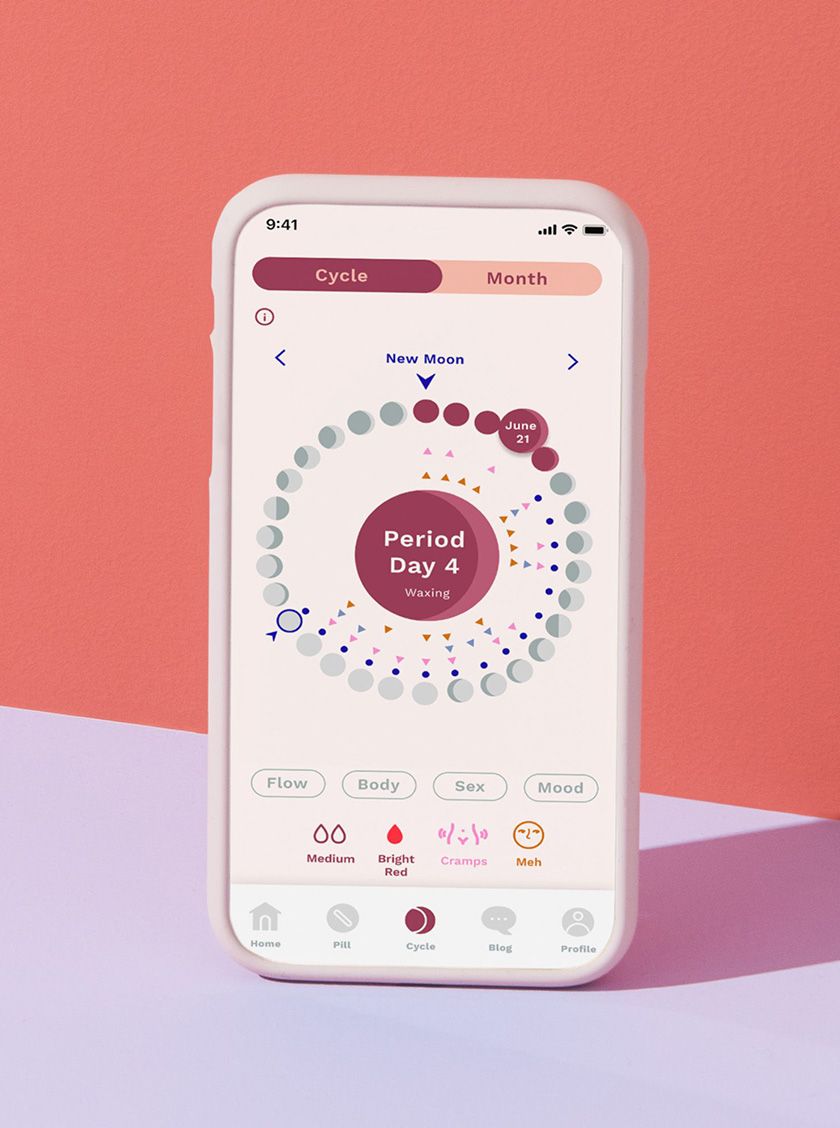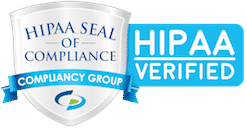Emme is a HIPAA-compliant company and your data privacy is our priority. Read more here.
How Technology Use Affects Menstrual Health
By Dr. Janine DelaneyDr. Janine Delaney holding the Emme Smart Case (case color: Rose March)
This article is inspired by Emme, a leader in technology for empowering women to take control of their bodies with their Bluetooth-enabled smart case that detects when a pill is taken and syncs with the app to remind you. As a wellness influencer, psychologist, and mother of two teenage daughters I am a huge fan of technology like this that allows us to stay organized and on track. Since I am on social media for work, I spend endless hours using technology and have found myself often feeling it is distracting me from other important parts of my life.
I understand the use of technology is a big part of my job, so I put up with its disadvantages, such as its impact on my eyes and sometimes negative comments from haters. That said, when I came across the Emme Smart Case + Pill & Health Tracker App and saw its effectiveness in reducing birth control side effects and the risk of unplanned pregnancy, I stopped for a minute and thought to myself: “Technology, when used in the right way, can be very, very useful.” Emme is one perfect example. Given that technology is such a big part of our modern life, I felt it was critical to explore how to use it correctly and help others consider when it can be good and when it can be harmful. Hence, my motivation to write this article.
Emme Smart Cases with the Pill & Health Tracker App
Why I love Emme
Before I get into my advice on the impact technology and social media can have on your menstrual health — newly redefined as “a state of complete physical, mental, and social well-being and not merely the absence of disease or infirmity” — let me tell you more about why I love Emme for the younger generation. Through its innovative technology, the Emme Smart Case uses built-in sensors to detect when a pill is removed and connects to the mobile app to automatically record the pills you take (or don’t) and help you remember to take your birth control pill on time, every time. It works with 100+ brands, specifically rectangular combination pill packs (21-day, 24-day, and 26-day active pill packs) OR rectangular progestin-only pill packs (24-day active and 4-day placebo packs, or 28-day active packs). The Emme Smart Birth Control System has been proven to reduce missed birth control pills by 80%, and you can even get a pill prescription online, right in the app. You really can’t beat that.
Positive impact
There are also many other amazing innovations when it comes to technology nowadays that can serve a useful part in our daily routine. I love some of the relaxation apps that help me unwind and visualize. Many of them are free and easy to access. They can also be great topics of conversation when with friends — allowing for a conversation on favorites and when they are used. Of course, health apps monitoring heart rate and calories burned are super popular, but then again it is important to take them in stride and not become obsessive; remember all things in moderation. There are some fun and helpful technologies out there for almost everyone. The thing to remember is when and where technology can start to become an issue rather than enhancing our lives.
The Emme app allows you to see patterns between your pill-taking and your body so you can confidently manage your month
As with any form of technology, the increased usage of social media in today’s society comes along with its own set of advantages and disadvantages. You are probably able to list some of these on your own. For example, social media enables us to share, in real-time, the places we go and the people we see. On the flip side, it can be time-consuming and can often distract us from other important things. What may surprise you is that there is a growing body of research indicating that one’s experience with social media can have a significant impact on mental health. As a psychologist and mother of teenage daughters, this concerns me. Since the chances of social media going away anytime soon are slim, the better we understand this relationship, the more we can be aware of how social media may impact our state of mind.
Let’s start by discussing the positives — because not all social media is bad. The ability to share experiences can be satisfying and rewarding. It can help us feel connected to a larger community of people with similar interests and is a great way to stay in touch with friends and family. In addition, when it comes to goal setting, social media is a good way to stay accountable and gain support from others to help you stay on track. For the younger generation, social media can help enhance communication skills and interpersonal connections. It can enforce the basic social and technical skills that are important for functioning in day-to-day society.
Things to watch out for
Unfortunately, despite these benefits, the increasing popularity of social media comes with a price. Studies have shown that factors such as the number of social media platforms someone has or the time spent daily on social media have an indirect correlation to measures of mental health. This does not mean that social media per se is the main reason for mental health issues, but it does indicate that it has an overall impact on well-being. Let’s take a closer look at why this may be happening.
The first and most obvious reason is that the more time we spend on social media, the less time we have for other things in our lives, like building healthy, sustainable relationships. Often social media can give us a false sense that we have active social lives, when in fact, it can prevent us from spending quality time with those around us. In the short term, social media interactions may feel satisfying, but over time they can lead to feelings of isolation and eventually depression. Face-to-face time is critical for developing true bonds with others.
Similar to this, overuse of social media has been found to negatively impact performance in other areas of life, including work, school, and other day-to-day responsibilities. Some experts claim people can become addicted to social media much in the same way they become addicted to other harmful habits. This can eventually result in consequences that lead to feelings of inadequacy or failure. For example, someone who spends the majority of their day scrolling through their Facebook feed may not finish their work on time, causing them to feel stressed and dissatisfied with their job. In turn, they may look to the instant gratification of social media to pull them out of their rut, only to dive deeper into this negative pattern.
In addition to serving as a distraction, the adrenaline rush experienced through approval (in the form of likes or comments) serves as a temporary mood enhancer, resulting in a ‘crash effect” when our expectations are not met. People often find themselves feeling inadequate due to the “in-your-face” friend tallies, status updates, and pictures of others having a good time. This can alter our sense of reality and impact self-esteem, particularly when it comes to body image.
So what can we do about this?
Here are some simple tactics to help you monitor your use of social media so you can still enjoy it, but also keep a check on your sanity:
- Decide on a specific chunk of time each day that you will put down your phone and focus on the present. You will notice your attention and focus become stronger on what you are doing in the here and now. A great example of this is my high school junior who puts her phone upstairs when she does homework. It takes her half the amount of time and she is more accurate.
- If you need to have your phone by you (expecting that call from your Dr.), turn off notifications so you don’t become distracted. Sometimes I put my phone on “Airplane” mode or “Do Not Disturb” when I am at my computer trying to get work done. This way it is close by, but I can choose to use it as I need.
- Delete apps that contribute to unhealthy body image or other feelings of inadequacy. Add apps that help you feel better about yourself or inspire you to engage in healthy behaviors.
- Use apps that tell you about your usage. This will help to increase your awareness of how much you are engaging with social media and is a great reality check.
- Use an alarm clock to wake up instead of relying on your phone. As a general rule, I never have my phone near my bed. Sleep time is crucial for restorative health and I like to take advantage of every minute.
- Take a day off from social media to focus on other things. Sunday is a good suggestion since it is a day when you probably aren’t in school or at work. Your family will appreciate this and you will be able to spend more quality time together.
- Ditch your phone at the dinner table. Mealtime should be about conversation. There is nothing that critical on social media that can’t wait until you are finished eating.
- Consider how you would ideally like to spend your time. Ask yourself: How much time do I want to spend using social media? How can I connect with people I care about in other ways, such as talking on the phone or meeting in person?
Feel like yourself again
Awareness is the first key to understanding behavior. If you are reading this, you are off to a good start by recognizing the risks platforms such as Facebook, Instagram and Twitter can have on your menstrual health. By understanding these pitfalls, people of all ages can benefit from making their social media and other technology experiences positive ones that enhance relationships and sense of self, rather than creating vicious cycles of time consumption and self-doubt.
If you’re on the pill, Emme’s Complete Birth Control System can help too. By automating your pill-taking and delivering discreet, customized reminders only when you need them, the smart case and mobile app will support your mental and reproductive health for years to come. With improved confidence and reduced anxiety, you’ll spend less time searching for “how to deal with birth control pill side effects” and more time doing the things that give you energy. Now that’s a technology worth investing in.
I choose to include Emme’s mission and values below because they really hit home for me, and I know they will hit home for you as well.
Emme's Mission
Women’s health in women’s hands.
There’s a time and place for women’s health and it’s always and everywhere.
Emme's Values
Strong women empower the world.
When women are healthy, educated and free to live our fiercest lives, everyone benefits.
We believe in choice, choice, choice.
From the big one—deciding pregnancy—to the hundreds of daily choices that make us who we are.
Knowledge is always powerful.
When you have real data, access and support, you can strike a better balance in your own body.
There’s magic in the sisterhood.
We’re about connecting women, girls, boss ladies, supermoms— and their physicians and allies.
Bottom line
Be strong, be fierce, be yourself, and most importantly, use social media and technology wisely and to your advantage!
See how the Emme Smart Birth Control System can help you miss fewer pills and feel a million times better:
- Emme Smart Case — award-winning technology to automatically track your pills
- Emme Pill & Health Tracker App — track your flow, mood, sex, and more to know your body better
- EmmeRx — get an online prescription and birth control pills delivered right to your door
...






